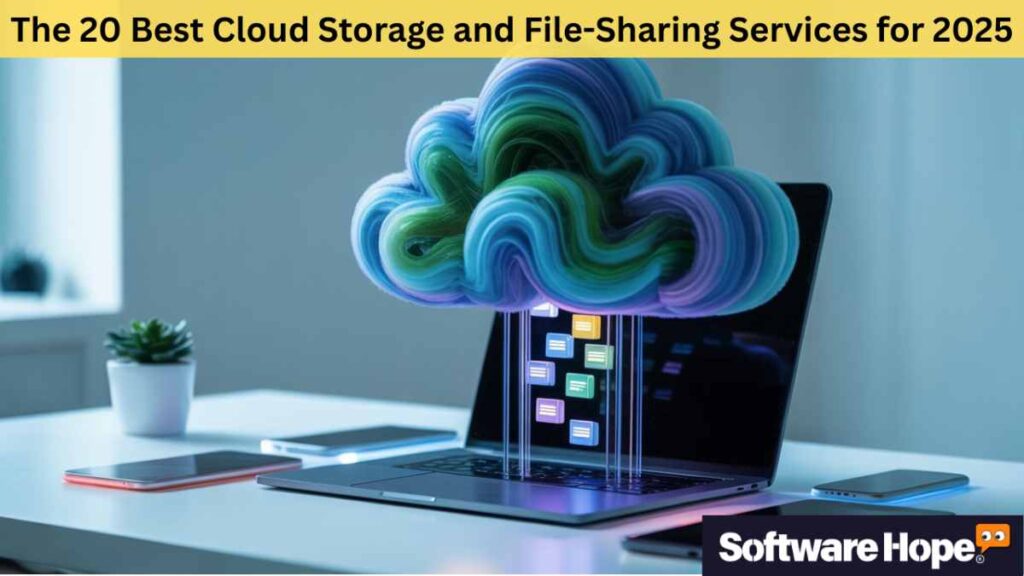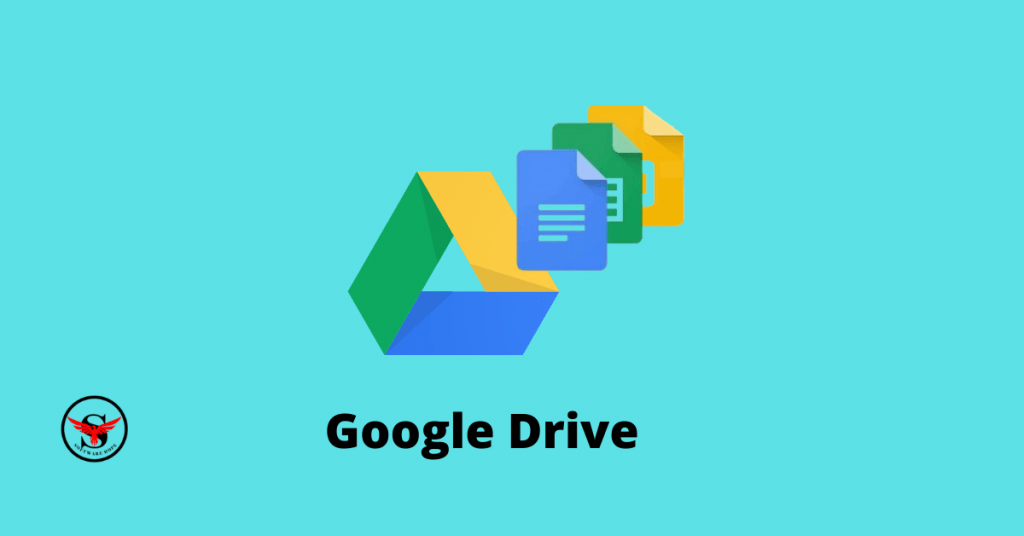Let’s be honest — we all need a safe spot to keep our stuff online these days. Could be your family photos, work files, or that giant video you just can’t delete (yep, you know the one). That’s where cloud storage comes in. It’s kind of like having a digital locker you can open from anywhere — your phone, laptop, or even your friend’s computer.
There are loads of choices out there. You’ve got the big ones like Google Drive and Dropbox, plus some newer options that really focus on privacy and security. In this guide, we’re gonna check out the 20 best cloud storage services for 2025 — everything from best free cloud storage to fancy paid plans with all the extras.
So stick around. By the time we’re done, you’ll know exactly which cloud data storage option is right for you, whether you just want a bit of free online storage or you’re ready to go big with something like Amazon S3 storage for serious online data storage needs.
Table of Contents
Comparison of 20 Best Cloud Storage and File-Sharing Services
| Sr | Image | Name | Rating | Pricing | Compatibility | Features | Website | Details Page |
|---|---|---|---|---|---|---|---|---|
| 1 |

|
Amazon S3 |
4.5
|
Paid | Web-based |
|
Visit Website | View Details |
| 2 |

|
Proton Drive |
4.0
|
Freemium | Windows,Mac,Linux,Android,iOS,Web-based |
|
Visit Website | View Details |
| 3 |

|
NordLocker |
4.5
|
Freemium | Windows, Mac, Android, iOS |
|
Visit Website | View Details |
| 4 |

|
Tresorit |
4.5
|
Paid | Windows,Mac,Linux,Android,iOS,Web-based |
|
Visit Website | View Details |
| 5 |

|
Sync.com |
4.0
|
Freemium | Windows,Mac,Linux,Android,iOS,Web-based |
|
Visit Website | View Details |
| 6 |

|
Nextcloud |
4.5
|
Free | Windows,Mac,Linux,Android,iOS,Web-based |
|
Visit Website | View Details |
| 7 |

|
MEGA |
4.0
|
Freemium | Windows,Mac,Linux,Android,iOS,Web-based |
|
Visit Website | View Details |
| 8 |

|
iCloud |
4.0
|
Freemium | Mac,iOS,Web-based |
|
Visit Website | View Details |
| 9 |

|
OneDrive |
4.0
|
Freemium | Windows,Mac,Android,iOS,Web-based |
|
Visit Website | View Details |
| 10 |

|
Icedrive |
4.0
|
Freemium | Windows,Mac,Android,iOS,Web-based |
|
Visit Website | View Details |
| 11 |

|
Google Drive |
4.5
|
Freemium | Windows,Mac,Android,iOS,Web-based |
|
Visit Website | View Details |
| 12 |

|
IDrive |
4.0
|
Paid | Windows,Mac,Linux,Android,iOS |
|
Visit Website | View Details |
| 13 |

|
Koofr |
3.5
|
Freemium | Android,iOS,Web-based |
|
Visit Website | View Details |
| 14 |

|
Box |
4.5
|
Freemium | Windows,Mac,Android,iOS,Web-based |
|
Visit Website | View Details |
| 15 |

|
WeTransfer |
4.0
|
Freemium | Web-based,Android,iOS |
|
Visit Website | View Details |
| 16 |

|
Filen |
4.0
|
Freemium | Windows,Mac,Linux,Android,iOS,Web-based |
|
Visit Website | View Details |
| 17 |

|
Google Workspace |
5.0
|
Paid | Windows, Mac, Linux, iOS, Android, Web-based, Chromebook |
|
Visit Website | View Details |
| 18 |

|
WordPress |
4.0
|
Freemium | Web-based,Android,iOS |
|
Visit Website | View Details |
| 19 |

|
Cloudflare |
4.5
|
Freemium | Web-based |
|
Visit Website | View Details |
| 20 |

|
Microsoft OneDrive |
4.0
|
Freemium | Windows,Mac,Android,iOS,Web-based |
|
Visit Website | View Details |
1. Amazon S3: Amazon S3 cloud storage is super reliable for businesses and powers big websites like Netflix behind the scenes
Amazon S3 is like the granddaddy of cloud storage — it’s been around forever and secretly powers a huge part of the internet. This isn’t really where you’d dump your weekend photos like you would on Google Drive. It’s more for businesses and developers who need heavy-duty Amazon S3 storage to run their websites and apps. Think of it like the engine room that keeps Netflix, Airbnb, and thousands of other sites running without a hitch.
What makes S3 awesome is how reliable it is. We’re talking 99.999999999% durability — which basically means your files aren’t going anywhere. Ever. Not gonna lie, the dashboard can feel a bit techy if you’ve never used online data storage before. But for businesses dealing with massive amounts of files, it’s pure gold. And the best part? It scales like crazy. You can start small and grow to store pretty much endless data. You’ll see what I mean when you try it.
Key Features
- Virtually unlimited scalability that grows with your business needs
- Multiple storage classes to optimize costs based on access frequency
- Advanced security features including encryption and access controls
- Integration with hundreds of other Amazon Web Services tools
- Global content delivery network for faster file access worldwide
- Automated backup and disaster recovery options built right in
Pros & Cons
✅ Pros
- The best reliability you'll find anywhere — seriously rock-solid infrastructure
- Pay only for what you actually use, which can save tons of money
- Integrates seamlessly with other AWS services if you're already using them
- Global reach means your files load fast no matter where users are
- Industry-standard security that meets compliance requirements for most businesses
- Honestly, the performance is just incredible once you get it set up
❌ Cons
- Learning curve is pretty steep if you're not technically minded
- Costs can add up quickly if you're not careful with usage monitoring
- Interface feels overwhelming for simple personal storage needs
- Support can be expensive unless you're on a higher-tier plan
Device Compatibility:
-
Yeah, S3 works with pretty much everything through APIs and SDKs. You can access it from web browsers, mobile apps, or integrate it directly into your software projects.
Pricing:
-
S3 uses pay-as-you-go pricing starting around $0.023 per GB per month for standard storage. There’s no free tier for ongoing storage, but you get some free usage when you first sign up. Not too bad for enterprise-level reliability, honestly.
Customer Support:
-
Amazon offers different support tiers starting with basic online resources for free, then paid support plans ranging from $29 to $15,000+ per month. Live chat and phone support are available with paid plans — pretty comprehensive if you need it.
2. Proton Drive: Proton Drive gives you private cloud storage that locks your files so well that even they can't see what you have
Proton Drive is from the same people who made ProtonMail, and they’re all about privacy — like, seriously. This cloud storage keeps your stuff locked up before it even leaves your device. That means not even Proton can peek at your files. Pretty cool if you want online data storage that’s safer than your diary with three locks on it.
The design is super clean and simple, kind of like what you’d see in Google Drive — just way more private. And that’s nice, because you don’t have to mess around with weird settings or click through a bunch of menus. It just works. You can still store and share your files easily, but with the peace of mind that your cloud data storage is totally safe from nosy people.
Key Features:
- End-to-end encryption means your files are scrambled before upload
- Based in Switzerland with strong privacy laws protecting your data
- Clean, intuitive interface that doesn’t require a tech degree to use
- Automatic syncing across all your devices without compromising security
- File sharing with password protection and expiration dates built-in
- Honestly, this one’s really helpful for anyone paranoid about data privacy
Pros & Cons
✅ Pros
- The best privacy protection you'll find in mainstream cloud storage
- Swiss jurisdiction means better legal protection for your data
- Interface is refreshingly simple compared to cluttered alternatives
- No ads or data mining since they use a subscription model
- Honestly, I liked how transparent they are about their security practices
- Integration with other Proton services if you're already using them
❌ Cons
- Storage space is pretty limited on the free plan compared to others
- fewer features than some competitors since they focus on security first
- Still relatively new so some advanced features are missing
- Can be slower than traditional storage due to encryption overhead
Device Compatibility:
-
Works great on Windows, Mac, Linux, Android, and iOS. The web interface runs smoothly on all modern browsers too.
Pricing:
-
Free plan gives you 1GB of storage. Paid plans start at around $4-5 per month for more space and features. There’s also bundles with their email service which can be a decent deal.
Customer Support:
-
Support’s decent — they have email support and a pretty good help center. Response times are usually reasonable, though they don’t offer live chat yet. Still working on expanding their support options.
3. NordLocker: NordLocker makes cloud storage super secure by scrambling your files before they even leave your computer
NordLocker is a cloud storage tool from the folks who made NordVPN, so you already know they’re serious about keeping stuff safe. It’s made for people who want super-strong security but don’t want a headache trying to set it up. It locks up your files right on your computer before they even get sent online, so even if someone grabs them, all they’ll see is a bunch of nonsense.
What’s cool is how simple they made it. You just drag and drop files, kind of like you would in Google Drive or any other online data storage service, and boom — they’re locked up tight. Not gonna lie, I was pretty surprised at how easy they made the whole “encryption” thing feel. It’s basically like having a personal vault that follows you around wherever you go.
Key Features:
- Zero-knowledge encryption that even NordLocker can’t break or access
- File sharing with end-to-end encryption and access controls
- Desktop applications that create encrypted folders on your computer
- Cross-platform syncing that maintains security across all devices
- Honestly, this one’s really helpful for sensitive business documents
- Integration with NordVPN for extra security layers if you want them
Pros & Cons
✅ Pros
- The best encryption implementation I've seen in consumer storage
- Interface makes complex security feel simple and approachable
- Comes from a trusted company with proven security track record
- No bandwidth limits on file transfers which is refreshing
- The best part is how it handles large files without breaking a sweat
- Desktop integration feels natural once you get used to it
❌ Cons
- Storage space is limited compared to mainstream competitors
- pricing is higher than basic storage services
- Some features require the desktop app rather than web-only access
- Still building out collaboration features for team use
Device Compatibility:
-
Yeah, it runs well on Windows, Mac, Android, and iOS. The desktop apps are particularly polished and integrate nicely with your file system.
Pricing:
-
Free plan offers 3GB of encrypted storage. Paid plans start around $2.99 per month for more space and features. Not too pricey considering the security level, honestly.
Customer Support:
-
Support’s pretty good — email support is responsive and they have a solid knowledge base. Live chat isn’t available, but their email responses are usually helpful and fairly quick.
4. Tresorit: Tresorit is like a Swiss bank for cloud storage - perfect for lawyers and doctors who need top-level security
Tresorit is like the Swiss bank of cloud storage — super safe, super private, and made for people who can’t risk their stuff getting out. It’s a Swiss-based service that uses zero-knowledge encryption, which is a fancy way of saying your files get scrambled with keys only you have. Not even Tresorit can peek.
It’s a big hit with lawyers, doctors, and companies that deal with really private info because it follows the strictest security rules. The whole platform feels polished and professional, but yeah… it’s more for business folks than casual users who just want a place like Google Drive for photos. Still, if you’ve got sensitive files or client work, this is gold.
And when you check out their security certifications, you’ll see — they’re dead serious about protecting your stuff. No messing around here.
Key Features:
- Zero-knowledge encryption with client-side key management
- Compliance with GDPR, HIPAA, and other strict data protection regulations
- Advanced permission controls for file and folder sharing
- Digital rights management to prevent unauthorized copying or printing
- Honestly, this one’s really helpful for professional collaboration needs
- Activity monitoring and audit trails for business accountability
Pros & Cons
✅ Pros
- The best security credentials you'll find in commercial cloud storage
- Swiss jurisdiction provides excellent legal protection for your data
- Interface is clean and professional without feeling intimidating
- Excellent collaboration features designed for business workflows
- The best part is how they handle compliance requirements automatically
- Honestly, I liked their transparent approach to security practices
❌ Cons
- Pricing is pretty steep compared to consumer-focused alternatives
- Might be overkill if you just need basic personal storage
- Some features feel complex for simple file sharing needs
- Storage limits are lower than what you get with mainstream services
Device Compatibility:
-
Works great on Windows, Mac, Linux, Android, iOS, and through web browsers. The mobile apps are particularly well-designed for business use.
Pricing:
-
Plans start with a Lite option at $57 per year for basic individual use. Business plans are significantly more expensive but include advanced features. No free plan available, but they do offer trials.
Customer Support:
-
Excellent support with email and phone options available. Response times are usually quick, and their support team really knows their stuff about security and compliance issues.
5. Sync.com: Sync.com mixes strong security with easy-to-use cloud storage that feels just like Google Drive but safer
Sync.com is a Canadian cloud storage service that’s all about privacy — but without making you feel like you need to be a tech genius to use it. They give you zero-knowledge encryption right from the start, which means your files are locked up so well, even Sync.com can’t peek inside. It’s kind of like having your own private vault in the cloud, but the app is still super easy to use for everyday stuff.
What makes Sync.com stand out is how they mix strong security with simple design. You’re getting protection that’s as good as what big companies use, but it feels just as easy as something like Google Drive. And honestly, that’s pretty rare. Most secure storage services make things tricky or confusing, but this one keeps it smooth. The best free cloud storage options out there usually skip this level of protection, so finding it here is actually really refreshing.
Key Features:
- Zero-knowledge encryption that protects files from unauthorized access
- Unlimited file versioning keeps track of changes automatically
- Built-in document editing without compromising encryption
- Advanced sharing controls with password protection and expiration dates
- Honestly, this one’s really helpful for both personal and business use
- Canadian privacy laws provide strong legal protection for your data
Pros & Cons
✅ Pros
- The best balance of security and usability I've seen in this category
- Interface feels familiar if you're coming from mainstream services
- Unlimited file versions means you'll never lose an important change
- Pricing is reasonable compared to other zero-knowledge providers
- The best part is how seamlessly the encryption works in the background
- Canadian jurisdiction offers better privacy protection than US-based services
❌ Cons
- Storage space on free plan is smaller than major competitors
- Some advanced features are still being developed
- Upload speeds can be slower due to client-side encryption
- Mobile apps could use a few more features compared to desktop
Device Compatibility:
-
Yeah, it runs well on all the major platforms — Windows, Mac, Linux, Android, and iOS. The web interface is smooth and works great in any modern browser.
Pricing:
-
Sync.com has more affordable plans compared to competitors, with free accounts offering 5GB and paid plans starting around $8 per month for individuals. Business plans are competitively priced too.
Customer Support:
-
Support’s decent — email support is available with reasonably quick response times. They have a good help center too, though live chat would be nice to see in the future.
6. Nextcloud: Nextcloud lets you build your own personal cloud storage where you control everything and keep all your data
Nextcloud is like the ultimate DIY cloud storage. It’s open‑source, which means you can put it on your own server or use it through different hosting companies. Think of it as building your own personal Google Drive — except you’re the boss, and you keep all the control. It’s great for tech‑savvy folks who want all the good stuff modern cloud storage offers but don’t want their files sitting with big companies.
The cool thing? It’s super flexible. You can add hundreds of apps and add‑ons to make it work exactly how you want. Yep, that’s pretty helpful if you need stuff you can’t get from other online data storage services. And once you start checking out the app store, you’ll see what I mean — there’s everything from calendars to video calls, all built right in.
Key Features:
- Complete control over your data with self-hosted or managed options
- Hundreds of apps available to extend functionality beyond basic storage
- Advanced collaboration tools including real-time document editing
- Enterprise-grade security features with customizable access controls
- Honestly, this one’s really helpful for organizations with specific requirements
- Integration capabilities with virtually any other software or service
Pros & Cons
✅ Pros
- The best privacy protection since you control where your data lives
- Interface is surprisingly polished for an open-source project
- Incredibly flexible with customization options for any use case
- No vendor lock-in means you can move your data anytime
- The best part is the active community constantly improving the software
- Cost can be very low if you self-host on existing hardware
❌ Cons
- Technical setup can be challenging for non-technical users
- You're responsible for maintenance, updates, and security patches
- Performance depends heavily on your hosting setup and configuration
- Support quality varies depending on whether you self-host or use managed hosting
Device Compatibility:
-
Works everywhere — web browsers, mobile apps for Android and iOS, desktop sync clients for Windows, Mac, and Linux. The ecosystem is really comprehensive.
Pricing:
-
It’s free if you self-host, but you’ll need server costs. Managed hosting starts around $5-10 per month depending on the provider. Enterprise support and features cost extra but are still competitive.
Customer Support:
-
Community support is excellent through forums and documentation. Paid support is available through various providers if you need guaranteed response times and professional help.
7. MEGA: MEGA gives you 20GB of free cloud storage with strong privacy protection - way more space than most others
MEGA showed up in the cloud storage world with a super generous free plan and strong privacy, and it quickly became a favorite for people who want a lot of space without spending money. You get 20GB of free cloud storage right away, and if you want, you can bump that up by another 10GB for a whole year. Pretty nice deal.
They use end-to-end encryption as the default, which means your files are safe even if someone tries to peek while they’re being sent. MEGA’s past is a bit colorful, but now they’re focused on being a legit, privacy-first online data storage service.
Not gonna lie — that free plan is a big reason why it’s so tempting, especially for students or casual users. You get a ton of space without paying a cent, and the extra layer of security makes it easy to trust. If you’ve tried stuff like Google Drive or other free online storage, you’ll see MEGA gives you way more room and peace of mind.
Key Features:
- Generous 20GB free storage tier that beats most competitors
- End-to-end encryption protects your files from unauthorized access
- Built-in chat and video calling features for collaboration
- File versioning keeps previous versions of your documents safe
- Honestly, this one’s really helpful for users who need lots of free space
- Browser-based interface works well without installing software
Pros & Cons
✅ Pros
- The best free storage allocation you'll find from major providers
- Strong encryption implementation protects your privacy automatically
- Interface is clean and straightforward without unnecessary complications
- Upload and download speeds are generally quite good
- The best part is how much you get without paying anything
- File sharing features work smoothly with password protection options
❌ Cons
- Bandwidth limit of about 5GB per day for free accounts
- Hmm... some people are still wary due to the company's controversial past
- Desktop sync client could be more polished compared to competitors
- Customer support response times can be slow on free accounts
Device Compatibility:
-
Yeah, it runs well on all platforms — Windows, Mac, Linux, Android, iOS, and works great in web browsers. The mobile apps are particularly solid.
Pricing:
-
20GB free with paid plans starting around $5.69 per month for 400GB. The value is pretty good considering the security features and generous free tier.
Customer Support:
-
Support’s available through email and help center. Response times can vary, but they’re generally helpful once you reach them. Free users might wait longer for responses.
8. iCloud: iCloud is Apple's cloud storage that automatically syncs all your photos and files across your Apple devices
iCloud is Apple’s own cloud storage that works perfectly with all your Apple devices. If you’re already using an iPhone, iPad, or Mac, it’s kind of the obvious choice. It backs up your photos, files, and app stuff automatically — you don’t even have to think about it. Everything just stays in sync across your devices, giving you that “it just works” vibe Apple is famous for.
The best thing about iCloud is how you almost forget it’s there once you set it up. Your photos show up everywhere, your files are always up to date, and you hardly ever need to move or manage anything yourself. Not gonna lie, when it’s working right, it feels pretty magical. You’ll see what I mean when you take a photo on your phone and — boom — it’s already sitting on your laptop.
Key Features:
- Seamless integration across all Apple devices and services
- Automatic photo and video backup with intelligent organization
- iCloud Drive for storing any type of file with cross-device access
- Family sharing plans that let you share storage with up to six people
- Honestly, this one’s really helpful if you’re already using Apple products
- Built-in document collaboration through Pages, Numbers, and Keynote
Pros & Cons
✅ Pros
- The best integration you'll find if you use Apple devices exclusively
- Setup is incredibly simple and mostly happens automatically
- Photo management and sharing features are top-notch
- Family plans offer great value for households with multiple Apple users
- The best part is how everything syncs without you having to think about it
- Privacy protection is generally good with encryption in transit and at rest
❌ Cons
- Pretty much useless if you don't use Apple devices regularly
- pricing isn't competitive compared to platform-agnostic alternatives
- Limited collaboration features compared to services like Google Drive
- No zero-knowledge encryption option for users who want maximum privacy
Device Compatibility:
-
Obviously works best on Apple devices — iPhone, iPad, Mac, and Apple TV. Limited web access is available for Windows users, but the experience isn’t great.
Pricing:
-
5GB free, then $0.99/month for 50GB, $2.99/month for 200GB, or $9.99/month for 2TB. Family plans can share the larger tiers. Pricing is reasonable if you’re buying Apple products anyway.
Customer Support:
-
Apple support is generally excellent with multiple contact options including phone, chat, and in-store help. Response times are usually quick and support quality is consistently good.
9. OneDrive: OneDrive is Microsoft's cloud storage that works perfectly with Windows and Office for easy file sharing
OneDrive is Microsoft’s cloud storage. It is built right into Windows and works really well with Office 365. If you’re already using Microsoft stuff for work or school, OneDrive makes things easy because everything just clicks together. It is great for sharing and working on documents with others, like in Word, Excel, or PowerPoint.
You get 5GB free, and if you need more space, their prices are pretty good. What’s cool is how OneDrive lets people work on the same file at the same time without messing things up. Honestly, this tight connection with Microsoft Office makes it super useful for business folks and students alike.
If you’re thinking about cloud storage options, OneDrive stands out, but you might also check out Google Drive or even Amazon S3 storage for different needs. For free online storage, OneDrive is one of the best free cloud storage choices out there, especially if you want your files to work smoothly with Microsoft tools.
Key Features:
- Deep integration with Microsoft Office suite for seamless document editing
- Real-time collaboration that lets multiple users edit simultaneously
- Personal Vault for extra security on sensitive files
- Automatic photo backup from mobile devices with facial recognition
- Honestly, this one’s really helpful if you’re already in the Microsoft ecosystem
- Version history and file recovery with generous retention periods
Pros & Cons
✅ Pros
- The best integration with Microsoft Office applications and workflows
- OneDrive is cheaper than Google Drive for the same storage space
- Real-time collaboration features are smooth and reliable
- Personal Vault adds extra security for important documents
- The best part is how it's built right into Windows 10 and 11
- Family plans offer excellent value for households using Microsoft products
❌ Cons
- Limited usefulness if you don't use Microsoft products regularly
- Sync can be slower compared to some dedicated storage services
- Privacy policies aren't as strong as some security-focused alternatives
- Mobile apps feel less polished than the desktop experience
Device Compatibility:
-
Excellent on Windows with built-in integration. Also works well on Mac, Android, and iOS. Web interface is solid and mobile apps cover all the basics.
Pricing:
-
5GB free, then $1.99/month for 100GB or $9.99 for 1TB. Often bundled with Office 365 subscriptions which can provide excellent value. $12.99 for 6TB shared between 6 users is pretty competitive for families.
Customer Support:
-
Microsoft support is generally good with multiple contact options. Response times vary, but support quality is usually helpful, especially for business customers.
10. Icedrive: Icedrive combines super strong security with a modern, clean design in their cloud storage service from the UK
Icedrive is a newer cloud storage service from the UK. It mixes a clean, modern design with strong security. They use something called Twofish encryption — and get this, it’s actually seen as even safer than the usual AES stuff that most other services like Google Drive or Amazon S3 storage use.
The way Icedrive looks and works is super slick. It kind of feels like a real app on your computer, not just some website. Most online data storage sites look a bit old-school, but this one’s different.
What makes Icedrive really cool is how it balances safety and style. A lot of cloud data storage tools are either secure but boring, or nice-looking but not super safe. Icedrive does both. So if you’re tired of free online storage that looks like it’s from 2010, you’ll see what I mean when you try it out. It’s got that fresh, easy-to-use vibe, but still keeps your stuff locked down.
Key Features:
- Twofish encryption provides stronger security than standard AES
- Modern interface design that feels like a native desktop application
- Client-side encryption ensures your files are protected before upload
- Zero-knowledge architecture means Icedrive can’t access your data
- Honestly, this one’s really helpful for users who want security without ugly interfaces
- Built-in media streaming for photos, videos, and music files
Pros & Cons
✅ Pros
- The best looking interface I've seen in secure cloud storage
- Twofish encryption is technically superior to what most competitors use
- UK jurisdiction provides reasonable privacy protection
- Performance is solid with good upload and download speeds
- The best part is how they've made security feel approachable
- Pricing is competitive considering the security features included
❌ Cons
- Still relatively new so some features are missing compared to established services
- Limited third-party integrations since they're still building partnerships
- Customer support options are more limited than major competitors
- Free storage tier is smaller than what you get from mainstream services
Device Compatibility:
-
Works on Windows, Mac, Android, and iOS with native applications. The web interface works well in modern browsers and maintains the same clean design.
Pricing:
-
Free plan offers 10GB of storage. Paid plans start around $1.67 per month for more space and features. The pricing is pretty reasonable for the security level you get.
Customer Support:
-
Support’s available through email and help center. Being a smaller company, response times can vary, but they’re generally helpful when you reach them.
11. Google Drive: Google Drive is popular cloud storage that lets you work on docs with friends in real-time and search anything fast
Google Drive is probably the most well-known cloud storage out there, and it makes sense. It works super well with Gmail, Google Photos, and all the other Google stuff. You get 15GB of free online storage, but keep in mind—it’s shared between Gmail, Google Photos, and Drive.
One of the best things about Google Drive is how easy it is to work with others. You and your friends or coworkers can all type on the same doc, spreadsheet, or slide at the same time. It’s great for school projects or team stuff.
What really makes Google Drive stand out is how smooth it is with other Google apps. Your files save on their own, your phone pics can back up right away, and you can find stuff fast using Google’s search. That’s super handy if you already use Gmail or have an Android phone.
And the way you can work with people in real-time? Honestly, it’s one of the best parts. If you’re doing group work or sharing files a lot, this is one of the best free cloud storage options out there.
Key Features:
- Deep integration with Gmail, Google Photos, and Google Workspace
- Real-time collaboration on documents, sheets, and presentations
- Powerful search functionality that can find text inside images and documents
- Automatic backup of photos and videos from mobile devices
- Honestly, this one’s really helpful for students and business collaboration
- Version history and commenting features for document review workflows
Pros & Cons
✅ Pros
- Google Drive offers up to 30TB of storage for users who need lots of space
- Free 15GB is more generous than most competitors
- Collaboration features are industry-leading and incredibly smooth
- Search functionality is unmatched for finding files quickly
- The best part is how everything syncs automatically across devices
- Integration with third-party apps through Google Workspace marketplace
❌ Cons
- Privacy concerns since Google scans files for advertising and other purposes
- Hmm... storage is shared between Drive, Gmail, and Photos which fills up fast
- Can feel overwhelming with so many features and integration options
- Offline access requires some setup and isn't as seamless as competitors
Device Compatibility:
-
Yeah, it runs well on all platforms — Windows, Mac, Android, iOS, and works perfectly in web browsers. Google’s mobile apps are particularly polished and feature-rich.
Pricing:
-
15GB free (shared with Gmail and Photos). Paid plans start at $1.99/month for 100GB, going up to $9.99/month for 2TB. Family plans let you share storage with up to 5 other people.
Customer Support:
-
Support’s decent for paid users with email and chat options. Free users are mostly limited to help articles and community forums, though the documentation is pretty comprehensive.
12. IDrive: IDrive is cloud storage that backs up all your devices at once - perfect for families with lots of phones and computers
IDrive does cloud storage a little differently. Instead of just letting you sync files like Google Drive, it really leans into backup stuff. It’s made for people who want to protect their whole computer, not just toss a few files online.
One cool thing is you can back up a bunch of devices with one account. That makes it super handy (and way cheaper) for families or small businesses with a bunch of phones and computers to keep safe.
What makes IDrive stand out is how it mixes old-school backup tools with new cloud storage features. So yeah, you get the best of both worlds. You’ll see what I mean — you can set it up to back up your whole computer without doing anything, but you also get a folder that works kind of like Google Drive for your day-to-day stuff.
So if you’re looking for something more than just free online storage, IDrive gives you both backup and cloud data storage in one. Pretty neat.
Key Features:
- Multiple device backup under a single account for great value
- Continuous data protection with automatic incremental backups
- Advanced versioning that keeps multiple versions of changed files
- Military-grade encryption with optional private key management
- Honestly, this one’s really helpful for comprehensive data protection
- Hybrid sync and backup functionality in one servic
Pros & Cons
✅ Pros
- The best value for backing up multiple devices under one account
- Backup functionality is more comprehensive than typical storage services
- Encryption options include zero-knowledge private key management
- Interface balances advanced features with reasonable usability
- The best part is how it handles both backup and sync needs together
- Pricing is very competitive considering how many devices you can protect
❌ Cons
- Interface can feel complex if you just want simple file storage
- Initial backup can take a very long time with lots of data
- Mobile apps focus more on backup than convenient file access
- Some advanced features require technical knowledge to set up properly
Device Compatibility:
-
Works well on Windows, Mac, Linux, Android, and iOS. Desktop clients are particularly robust for comprehensive backup needs.
Pricing:
-
Plans start around $3.98 for the first year for 5TB of storage covering unlimited devices. Regular pricing is higher but still competitive for the features included.
Customer Support:
-
Support’s pretty good with phone and email options available. Response times are reasonable and support staff generally knows their technical stuff well.
13. Koofr: Koofr helps you manage all your different cloud storage accounts in one place with strong European privacy
Koofr is a cloud storage service from Europe, but it’s not trying to replace the ones you already use. Instead, it helps you bring all your stuff together. Think of it like a control center where you can manage files from Google Drive, Dropbox, OneDrive, and a few others—all in one place.
It’s super handy if your files are all over the place and you just want one spot to keep track of everything. No more jumping between a bunch of browser tabs. With Koofr, it all feels smooth and simple.
Koofr also gives you its own storage space, which is great if you care about privacy. Since it’s based in Slovenia, it follows strong European data protection rules. That’s a big win if you’re looking for cloud data storage that keeps your stuff safe.
So yeah, if you’re tired of juggling different cloud accounts, Koofr kind of makes it all way easier to handle. It’s like having a super chill folder that pulls everything together—even your best free cloud storage services.
Key Features:
- Unified interface for managing multiple cloud storage accounts
- European-based with strong GDPR privacy protections
- Duplicate file detection across all connected storage services
- Advanced search that works across all your connected accounts
- Honestly, this one’s really helpful for organizing scattered cloud storage
- Direct file transfers between different cloud services without downloading
Pros & Cons
✅ Pros
- The best solution for managing multiple existing cloud storage accounts
- Privacy protection is excellent with European jurisdiction
- Interface design is clean and makes multi-account management simple
- Duplicate detection helps you clean up wasted space across services
- The best part is how it unifies search across all your storage accounts
- Pricing is reasonable considering the organizational features
❌ Cons
- Limited appeal if you only use one main cloud storage service
- Some advanced features require connecting to other paid services
- Storage space on their own servers is limited compared to major competitors
- Fewer collaboration features since it focuses on personal organization
Device Compatibility:
-
Works great through web browsers and has mobile apps for Android and iOS. Desktop sync is available but the web interface is where it really shines.
Pricing:
-
Free plan offers 10GB of Koofr storage plus connection to other services. Paid plans start around $3.50 per month for more storage and features.
Customer Support:
-
Support’s decent with email help available. Response times are reasonable, and they have good documentation for connecting different services.
14. Box: Box is business-focused cloud storage with extra security and admin tools for teams handling important work files
Box is mostly made for businesses and teams. It’s not just your average cloud storage. It’s built to help people at work share files and get stuff done together, safely. You’ll find things like admin tools, strong security, and ways to connect with other business apps. Stuff you won’t usually see in regular online data storage like Google Drive.
You can use Box by yourself, but it’s really meant for teams. It’s kind of like using a huge toolbox when all you need is a tiny wrench. But if you’re working with others—especially on important stuff—it’s super helpful. Lots of people in places like hospitals or banks use it ’cause of the extra security and controls.
And yeah, it might feel like too much if you just want a place to back up photos. But for work stuff? It’s awesome. Once you’re sharing cloud data storage with others, you’ll see how helpful those permission settings are. You get to decide exactly who can see what. That’s a big deal when files are private or important.
Key Features:
- Enterprise-grade security with advanced admin controls
- Workflow automation and approval processes for document management
- Integration with hundreds of business applications and services
- Advanced compliance features for industries with strict regulations
- Honestly, this one’s really helpful for businesses handling sensitive data
- Detailed audit trails and activity monitoring for accountability
Pros & Cons
✅ Pros
- The best enterprise features and admin controls available
- Security and compliance capabilities meet the highest industry standards
- Integration ecosystem is extensive for business workflows
- Collaboration features are designed for professional team environments
- The best part is how it handles complex permission and access scenarios
- Mobile apps include business-focused features like digital signatures
❌ Cons
- Pricing is expensive for individual users or small teams
- Interface can feel complex and overwhelming for simple storage needs
- Free tier is very limited compared to consumer-focused alternatives
- Features are overkill if you just need basic file storage and sharing
Device Compatibility:
-
Excellent compatibility across Windows, Mac, Android, iOS, and web browsers. Enterprise features work best on desktop platforms.
Pricing:
-
Limited free tier with 10GB. Business plans start around $7 per user per month. Enterprise pricing is higher but includes advanced security and compliance features.
Customer Support:
-
Excellent support for business customers with phone, chat, and dedicated account management. Free users have limited support options.
15. WeTransfer: WeTransfer isn't really cloud storage - it's just for sending big files quickly without accounts or hassle
WeTransfer isn’t your typical cloud storage. It’s really just made for one thing — sending big files fast. You upload something, get a link, and send that link to whoever needs it. That’s it. Super handy for folks like video editors, photographers, or designers who need to send huge files without all the hassle.
Using it is crazy simple. Just drag your files in, type an email or two, and hit send. No logins, no folders, no setting permissions like you do on Google Drive or other cloud storage apps.
What makes WeTransfer stand out is how it takes all the hard stuff out of sharing big files. Like, say you’ve got a 2GB video and your client needs it today. You don’t want to mess with email limits or sign-ups. You just want it sent. That’s where WeTransfer shines.
The free version keeps your files online for 7 days. That’s usually more than enough time for someone to grab what they need. It’s not meant for long-term cloud data storage like Amazon S3 or other online data storage tools — it’s just quick and easy sharing. And sometimes, that’s all you really need.
Key Features:
- Simple drag-and-drop interface for quick large file transfers
- No account required for basic file sending functionality
- Files available for download for up to 7 days on free plan
- Email notifications when files are downloaded by recipients
- Honestly, this one’s really helpful for one-time large file sharing needs
- WeTransfer Pro adds password protection and longer storage periods
Pros & Cons
✅ Pros
- The best simplicity for quick large file sharing without complexity
- No recipient account required — anyone can download with the link
- Interface is beautifully designed and incredibly intuitive to use
- Free tier handles files up to 2GB which covers most sharing needs
- The best part is how fast you can share large files with minimal setup
- Popular with creative professionals so recipients are usually familiar with it
❌ Cons
- Not really cloud storage — files disappear after the time limit
- Limited to 2GB per transfer on the free plan
- No permanent storage or organization features for your files
- Privacy isn't as strong as dedicated secure file sharing services
Device Compatibility:
-
Works perfectly in any web browser without software installation. Mobile apps are available but the web interface is so good you rarely need them.
Pricing:
-
Free for transfers up to 2GB. WeTransfer Pro costs around $15 per month and adds larger transfers, password protection, and longer storage periods.
Customer Support:
-
Support’s available through email and help center. Response times are decent, though free users might wait longer for non-urgent issues.
16. Filen: Filen is new German cloud storage that keeps your stuff super private without charging crazy high prices
Filen is a cloud storage service from Germany that’s all about privacy. It’s kind of new, but people are starting to notice it because it keeps your stuff super safe and doesn’t cost a ton. Everything gets locked (aka encrypted) on your device before it goes online. That means even Filen can’t peek at your files.
What’s cool is they made it look and feel modern, but still super secure. So yeah, all that strong security stuff? It doesn’t feel scary or hard to use. It’s actually kind of simple. If you’ve used something like Google Drive or Amazon S3 storage, you’ll feel right at home here — just with way more privacy.
It’s honestly nice to see a European option that actually cares about your data and doesn’t charge a crazy price. You’ll see how they took serious cloud data storage tools and made them easy for anyone to use. Like, you don’t have to be some tech genius to get it. Just good, safe, free online storage that actually makes sense.
Key Features:
- Zero-knowledge encryption with client-side key management
- German-based with strong European privacy laws protecting users
- Modern interface design that makes security features accessible
- Automatic photo backup from mobile devices with encryption
- Honestly, this one’s really helpful for privacy-conscious users on a budget
- File versioning and sharing with password protection included
Pros & Cons
✅ Pros
- The best price-to-security ratio I've seen from European providers
- Zero-knowledge encryption is implemented properly and transparently
- Interface feels modern and polished despite being from a smaller company
- German jurisdiction provides excellent privacy protection
- The best part is getting enterprise-level security at consumer prices
- Mobile apps work smoothly and maintain the same security standards
❌ Cons
- Still building features compared to more established competitors
- Customer support options are limited since they're a smaller company
- Third-party integrations are minimal compared to mainstream services
- Upload speeds can be slower due to client-side encryption processing
Device Compatibility:
-
Works well on Windows, Mac, Linux, Android, and iOS. Web interface is clean and mobile apps handle the basics effectively.
Pricing:
-
Free plan offers 10GB of storage. Paid plans start around $3 per month for 100GB. The pricing is very competitive for zero-knowledge encryption.
Customer Support:
-
Support’s available through email and help center. Being a smaller company, response times can vary, but they’re generally helpful and knowledgeable.
17. Google Workspace and G Suite: Google Workspace gives businesses professional email and cloud storage that all works together smoothly
Google Workspace (used to be called G Suite) is kind of like Google’s toolkit for businesses. It gives you email, tools to work with your team, and cloud storage—all in one spot. If you like how Google Drive works, you’ll probably love this. You get pro email, video calls, and a bunch of ways to work on stuff with your team.
It’s basically the regular Google stuff, but built for work. And it comes with better security and tools for the boss to manage everything.
What makes Google Workspace really cool is how everything just works together. Gmail, Google Drive, Calendar, and Meet all talk to each other and stay in sync. Honestly, I didn’t expect it to work that smoothly until I tried it myself.
You’ll see what I mean. You can hop on a video call, talk with your team, and edit the same doc at the same time. And it all saves to your cloud storage like magic. No extra steps. No losing files. Just everything right there in your Google Drive—or whatever online data storage you’re using.
Key Features:
- Professional Gmail with your custom domain and advanced security features
- Shared Google Drive storage that scales from 30GB to 5TB per user
- Real-time collaboration on documents, sheets, and presentations with your team
- Google Meet for video conferences with up to 500 participants depending on plan
- Advanced admin controls for managing users, security, and data access policies
- Honestly, this one’s really helpful for businesses that need everything integrated
Pros & Cons
✅ Pros
- The best integration between email, storage, and collaboration tools available
- Professional email addresses make your business look more legitimate and trustworthy
- Real-time editing features are incredibly smooth and rarely have conflicts
- Scales easily from small teams to enterprise organizations with thousands of users
- The best part is how familiar it feels if you already use regular Google services
- Honestly, I liked how the admin panel makes managing users pretty straightforward
❌ Cons
- Pricing adds up quickly when you have lots of team members
- Some advanced features require the more expensive business plans
- Privacy concerns since Google still scans some data for security purposes
- Can feel overwhelming if you just need simple file storage without business features
Device Compatibility:
-
Yeah, it runs perfectly on all platforms — Windows, Mac, Android, iOS, and web browsers. The mobile apps are especially polished and work great for business use.
Pricing:
-
Plans start at $6 per user per month for Business Starter with 30GB storage, $12 per month for Business Standard with 2TB storage, and $18 per month for Business Plus with 5TB storage. There’s also enterprise pricing for larger organizations. Not too pricey considering what you get, honestly.
Customer Support:
-
Google’s support is pretty solid for Workspace users with email, chat, and phone support available depending on your plan. Response times are usually reasonable, and they have extensive documentation and help resources.
18. WordPress: WordPress can work with cloud storage services to automatically back up your website content and media files
WordPress might seem like just a tool to build websites, but it’s actually way more than that. It’s a solid platform for sharing stuff online and keeping it all safe with cloud storage. Whether you’re using WordPress.com (the hosted one) or doing it yourself with WordPress.org, you still get cool stuff like built-in media tools, file sharing, and ways to connect with things like Google Drive and other online data storage options. It works great for bloggers, small biz owners, or really anyone who wants to post and share stuff on the web.
One thing that makes WordPress awesome for handling files is how it deals with photos, videos and docs. You get an easy-to-use media library, plus it can back everything up to the cloud. You can even use plugins to hook it up to Amazon S3 storage, Google Drive, or other free online storage services.
It’s super handy when you have got a ton of files to manage. And the best part? You can set it up so stuff automatically syncs to your cloud data storage, which keeps all your content safe and easy to get to whenever you need it.
Key Features:
- Built-in media library for organizing photos, videos, and documents efficiently
- Automatic integration with CDNs and cloud storage services for better performance
- Plugin ecosystem that extends storage capabilities with hundreds of options available
- Multi-user access controls for teams managing content and file sharing
- Automatic backup plugins that sync your content to cloud data storage services
- Honestly, this one’s really helpful for content creators and businesses with media-heavy websites
Pros & Cons
✅ Pros
- The best content management system for organizing and sharing digital media
- Thousands of plugins available for extending cloud storage functionality
- Interface is user-friendly even for non-technical people managing files
- SEO features help your shared content get found more easily online
- The best part is how flexible it is for different types of content sharing needs
- Self-hosted version gives you complete control over your data and storage
❌ Cons
- The best content management system for organizing and sharing digital media
- Thousands of plugins available for extending cloud storage functionality
- Interface is user-friendly even for non-technical people managing files
- SEO features help your shared content get found more easily online
- The best part is how flexible it is for different types of content sharing needs
- Self-hosted version gives you complete control over your data and storage
Device Compatibility:
-
Works great through web browsers on any device. Mobile apps are available for iOS and Android for content management on the go.
Pricing:
-
WordPress.org software is free, but you’ll need hosting (starting around $3-10/month). WordPress.com has free plans with limited storage, and paid plans start around $4/month for more features and storage space.
Customer Support:
-
Support varies depending on your setup. WordPress.com offers email and chat support for paid plans. Self-hosted users rely on community forums, documentation, and their hosting provider’s support.
19. Cloudflare: Cloudflare speeds up websites worldwide and offers cloud storage tools for developers building fast sites
Cloudflare’s mostly known for being a CDN—that’s the thing that helps websites load faster—but it’s actually way more than that now. It’s turned into this all-in-one platform that also gives you cloud storage tools like R2 storage and Workers KV to manage your files. So if you’re a developer or a business trying to make your site faster and store stuff online, Cloudflare’s got your back.
Think of it like this: it’s the behind-the-scenes tech that makes sure your files load fast for people anywhere in the world. Kinda like if Google Drive, Amazon S3 storage, and a security system had a baby. Sounds weird, but it works.
What’s really cool is how it doesn’t just do one thing. Most companies stick to either speed, storage, or safety—but Cloudflare does all three. It can cache (save) your files all over the world, protect your site from attacks, and also give you online data storage without needing a bunch of different tools.
Honestly, I was pretty impressed. It’s rare to see one service handle so much—like fast loading times, security, and free cloud storage stuff—all in one place. You’ll see what I mean once you try it.
Key Features:
- R2 object storage that’s compatible with Amazon S3 but often cheaper
- Global CDN that caches your files in over 300 cities worldwide
- Workers platform for building serverless applications that handle file processing
- Advanced security features including DDoS protection and Web Application Firewall
- Honestly, this one’s really helpful for websites that need fast global file delivery
- Analytics and insights showing how your content performs across different regions
Pros & Cons
✅ Pros
- The best global performance for delivering files to users worldwide
- R2 storage offers significant cost savings compared to traditional cloud storage
- Free tier is surprisingly generous and covers most small website needs
- Security features are enterprise-grade and included with most plans
- The best part is how it makes your website faster without changing your code
- Developer-friendly with APIs and tools for custom storage solutions
❌ Cons
- Learning curve is pretty steep if you're not technically minded
- Some features require coding knowledge to implement properly
- Dashboard can feel overwhelming with so many options and configurations
- Best value comes when you use multiple Cloudflare services together
Device Compatibility:
-
Works with any website or application through APIs and integrations. Web dashboard works in all modern browsers, and they have mobile apps for monitoring.
Pricing:
-
Free plan includes basic CDN and DDoS protection. Paid plans start at $20/month for Pro features, with Workers starting at $5/month minimum charge. R2 storage pricing is competitive with other cloud storage providers. Pretty reasonable for the performance boost you get.
Customer Support:
-
Support quality depends on your plan level. Free users get community support and documentation. Paid plans include email support, with phone support available for higher-tier business plans.
20. Microsoft OneDrive: Microsoft OneDrive is built-in cloud storage for Windows that syncs your files automatically and works great with Office
Microsoft OneDrive is honestly one of the most slept-on cloud storage options out there. If you already use Windows or Microsoft Office, it’s kind of a no-brainer. It’s built right into Windows 10 and 11, so your stuff just syncs on its own. You don’t have to mess with anything. OneDrive’s great if you want online data storage that works quietly in the background and fits in with the Microsoft stuff you already use—like Word or Excel.
What really makes OneDrive stand out is how it keeps things simple but still packs in some cool features for work. Not gonna lie, I was surprised by how well it works with Microsoft Office. You can work on a Word doc or Excel sheet with someone else at the same time, kind of like Google Drive. But if you’re used to Word and Excel, it feels more normal. You’ll see what I mean. Your files save to the cloud while you’re working, and you can open them on any device, pretty much anytime.
Key Features:
- Deep integration with Windows and Microsoft Office suite for seamless workflows
- Personal Vault with extra security for sensitive files and documents
- Real-time collaboration on Word, Excel, and PowerPoint files with your team
- Automatic photo backup from your phone with intelligent organization features
- Version history that lets you restore previous versions of files easily
- Honestly, this one’s really helpful if you’re already using Microsoft products regularly
Pros & Cons
✅ Pros
- The best integration with Windows computers — it's literally built into the operating system
- Free 5GB storage tier is decent for basic personal use and testing
- Real-time Office collaboration features work incredibly smoothly
- Personal Vault adds extra security with two-factor authentication for important files
- The best part is how it handles large files and syncs them efficiently
- Honestly, I liked how it works seamlessly with Outlook and other Microsoft apps
❌ Cons
- Limited usefulness if you don't use Microsoft products regularly in your workflow
- Sync can sometimes be slower compared to dedicated cloud storage services
- Privacy policies aren't as strong as some security-focused alternatives
- Privacy is where OneDrive drops the ball compared to zero-knowledge providers
Device Compatibility:
-
Yeah, it runs perfectly on Windows with built-in integration. Also works well on Mac, Android, and iOS through dedicated apps. Web interface is solid and handles most tasks smoothly.
Pricing:
-
5GB free storage to get started, then OneDrive for Business Plan 1 costs $5.00 per user per month and gives you 1TB of storage per user. Personal plans are often bundled with Microsoft 365 subscriptions starting around $6.99/month. Business plans start at $6 per user/month with 1 TB of cloud storage. Pretty competitive honestly, especially when bundled with Office apps.
Customer Support:
-
Microsoft Support offers multiple contact options including phone support at (800) 865-9408, email, and extensive help center documentation. Support quality is generally good, especially for business customers with paid plans.
Heading
20 Best Business Process Automation Software & Workflow Tools (2026 Review)
Vijay Datt is a website developer, software expert, and SEO specialist. He writes about the latest software, graphic design tools, and SEO strategies. With expertise in web development and image creation, he helps businesses grow online. His articles provide valuable insights to enhance digital success.





